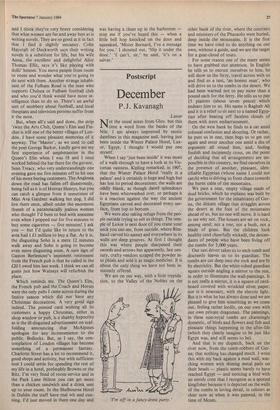Postscript
December
P.J. Kavanagh
Luxor
Not the usual notes from Glos. but this time a word from the banks of the Nile. I am always impressed by exotic datelines in this magazine and, having just been inside the Winter Palace Hotel, Lux- or, Egypt, I thought I would put one myself.
When I say 'just been inside' it was more of a walk-through to have a look at its Vic- torian vastness. Kipling remarked, in 1907, that the Winter Palace Hotel 'really is a palace' and it certainly is huge and high but has lost its period decorations; the walls are oddly blank, as though dated splendours have been whitewashed over, or perhaps it is a reaction against the way the ancient Egyptians carved and decorated every sur- face, from top to bottom.
We were also taking refuge from the peo- ple outside trying to sell us things. The tem- ple of Luxor is next door (if you crane your neck you can see, from outside, where Rim- baud carved his name) and everywhere in its walls are deep grooves. At first I thought this was where people sharpened their swords and arrows but apparently, last cen- tury, crafty vendors scraped the powder in- to phials and sold it as magic medicine. It is about the only thing we have not been in- sistently offered.
We are on our way, with a little trepida- tion, to the Valley of the Nobles on the 'I'm off to a fancy-dress party.' other bank of the river, where the courtiers and ministers of the Pharaohs were buried, deep inside the mountains. It is the first time we have tried to do anything on our own, without a guide, and we are the target for a gnat-cloud of touts.
For some reason one of the many seems to have grabbed our attention. In English he tells us to entrust ourselves to him, he will show us the ferry, travel across with us and find us a taxi, 'an honest man', who will drive us to the tombs in the desert. We had been warned not to pay more than a pound each for the ferry. He tells us to pay 15 piastres (about seven pence) which endears him to us. His name is Raghab Ali and it is a relief to sit next to a named Egyp- tian after beating off faceless clouds of them with stern embarrassment.
On the west bank he finds us a car amid colossal confusion and shouting. Or rather, he puts us in one, then begs us to get out again and enter another one amid a din of argument all round him, and, feeling foolish and incipiently cross, on the point of deciding that all arrangements are im- possible in this country, we find ourselves in the presence of another, pleasant, iden- tifiable Egyptian (whose name I could not catch) who is driving us from chaos towards the burnt calm of the mountains.
We pass a neat, empty village made of mud bricks, which he explains was built by the government for the inhabitants of Gur- na, the distant village that straggles across the desert at the foot of the mountains ahead of us, but no one will move. It is hard to see why not. The houses are set on rock, among sand; not a tree, not a bush, not a blade of grass. But the children took healthy (and cheerfully wicked), the descen- dants of people who have been living off the tombs for 3,000 years.
Our taxi driver takes us to each tomb and discreetly leaves us to its guardian. The tombs are cut deep into the rock and are lit by electricity. But the white-robed guardian squats outside angling a mirror to the sun, in order to illuminate the wall-paintings. It is not really a mirror, it is a square of card- board covered with wrinkled silver paper; nor is it nesessary, with the electric light. But it is what he has always done and we are pleased to give him something as we come out, feeling rather lordly, on our own with our own private dragoman. The paintings, in these non-royal tombs are charmingly domestic, of birds and flowers and fish and pleasant things happening in the after-life (which they clearly imagine to be just like Egypt was, and still seems to be).
And that is my dispatch, back on the river now, from the tomb-robbers of Gur- na; that nothing has changed much. I write this with my back against a mud wall, wat- ching women with shining metal pails on their heads — plastic seems barely to have reached Egypt — and noticing a bird with an untidy crest that I recognise as a spotted kingfisher because it is depicted on the walls of the tombs in loving detail, in colours as clear now as when it was painted, in the time of Moses.


































 Previous page
Previous page